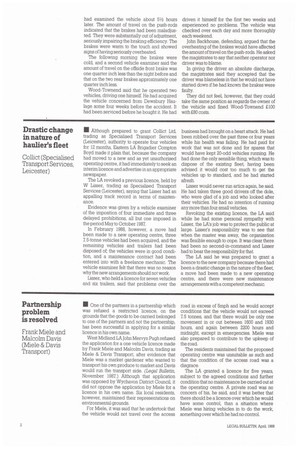Drastic change in nature of haulier's fleet
Page 4

If you've noticed an error in this article please click here to report it so we can fix it.
Collict (Specialised Transport Services, Leicester)
In Although prepared to grant Collict Ltd, trading as Specialised Transport Services (Leicester), authority to operate four vehicles for 12 months, Eastern LA Brigadier Compton Boyd made it plain that, because the company had moved to a new and as yet unauthorised operating centre, it had immediately to seek an interim licence and advertise in an appropriate newspaper.
The LA revoked a previous licence, held by W Lisser, trading as Specialised Transport Services (Leicester), saying that Lisser had an appalling track record in terms of maintenance.
Evidence was given by a vehicle examiner of the imposition of four immediate and three delayed prohibitions, all but one imposed in the period May to October 1987, In February 1988, however, a move had been made to a new operating centre, three 7.5-tonne vehicles had been acquired, and the remaining vehicles and trailers had been disposed of; the vehicles were in good condition, and a maintenance contract had been entered into with a freelance mechanic. The vehicle examiner felt that there was no reason why the new arrangements should not work.
Lisser, who held a licence for seven vehicles and six trailers, said that problems over the business had brought on a heart attack. He had been robbed over the past three or four years while his health was failing. He had paid for work that was not done and for spares that would have kept 20-odd vehicles running. He had done the only sensible thing, which was to dispose of the existing fleet, having been advised it would cost too much to get the vehicles up to standard, and he had started afresh.
Lisser would never run artics again, he said. He had taken three good drivers off the dole, who were glad of a job and who looked after their vehicles He had no intention of running any more than four small vehicles.
Revoking the existing licence, the LA said while he had some personal sympathy with Lisser, the LA's job was to protect the public at large. Lisser's responsibility was to see that when the master was away, the organisation was flexible enough to cope. It was clear there had been no second-in-command and Lisser had to bear the responsibility for that.
The LA said he was prepared to grant a licence to the new company because there had been a drastic change in the nature of the fleet, a move had been made to a new operating centre, and there were new maintenance arrangements with a competent mechanic.
















































































































